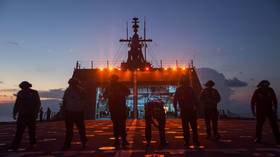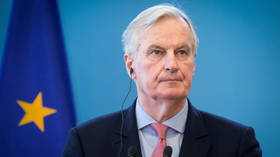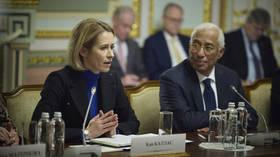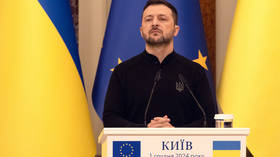Trump says time to stop ‘ENDLESS WARS’: So why does sabre-rattling against Russia & China continue?

Donald Trump has shown an apparent willingness to put the brakes on US military aggression abroad, notably in the Middle East and Central Asia. Yet the announcement coincided with more military moves against Russia and China.
One thing is obvious with regards to the ongoing US government shutdown – it has not affected the daily operations of the US military at all. While some 800,000 federal employees are enjoying a long unpaid vacation, members of the Armed Forces appear to be working overtime. And how could they not with the latest seasonal outbreak of Russo and Sino Phobia?
While there has been an outpouring of publicity over Donald Trump’s shock announcement that he would be withdrawing US troops from Syria, and possibly in other hotspots around the war-weary world, the US military remains on the prowl.
At the weekend, the Pentagon deployed three B-2 Stealth bombers and 200 airmen to Hawaii with the stated purpose of demonstrating America’s ability to “project power from anywhere in the world.” The site of the US deployment was no accident. China has been on the receiving end of these cute Hallmark greetings ever since Barack Obama announced his ill-fated ‘Asia Pivot’.
....Likewise, do not want the Kurds to provoke Turkey. Russia, Iran and Syria have been the biggest beneficiaries of the long term U.S. policy of destroying ISIS in Syria - natural enemies. We also benefit but it is now time to bring our troops back home. Stop the ENDLESS WARS!
— Donald J. Trump (@realDonaldTrump) January 13, 2019
This realignment of military forces was articulated by then US Secretary of State Hillary Clinton in an article in Foreign Policy entitled, ‘America’s Pacific Century’, which called for “forging a broad-based military presence” in China’s zone of influence. Needless to say, that pronouncement made Beijing sit up and take notice.
Today, Beijing continues to bolster its defenses as the US makes regular forays in the hotly contested South China Sea region, where China has laid claim to the majority of inlets and islands. It has even taken the ambitious step of turning rocky outcrops into ‘permanent aircraft carriers’ complete with airstrips, missiles and radar. The militarization of these waters makes it almost inevitable that some mishap – accidental or otherwise – will eventually occur. Just this past September, for example, a Chinese destroyer traveled within 45 yards (41 meters) of a US warship in a part of the Pacific Ocean that China considers its territory.
Also on rt.com ‘Global strike capability’: US deploys B-2 strategic bombers to Pearl Harbor for ‘24/7 watch’Business first, missiles later
Despite all this saber-rattling on both sides, the one big difference between Trump and Obama with regards to China, as well as Russia, is the heavy emphasis on economic factors. Considering that Donald Trump is first and foremost a businessman, this should come as no surprise. Yet it is no less worrying from a geopolitical perspective.
Indeed, economic factors are at least as important as strategic ones in Washington’s recently unveiled plans to have a US Navy warship sail through Arctic waters in what has been described in the media as a “show of force to Russia and China.” A show of “economic force” may be a better way of saying it. The Arctic has turned into a hot commodity as melting ice caps reveal an abundance of resources, including fossil fuels, diamonds, and other precious metals like platinum. Needless to say, for a venture capitalist like Trump, he will stop at nothing for a piece of this Arctic action.
But in the race for northern riches, America currently lags far behind Russia, and even China. Ever since Russia stunned the world back in 2007 by planting its national flag deep at the bottom of the North Pole seabed it has been actively building up its commercial and military presence in the region. Today, by way of example, Russia has over 40 icebreakers, while the United States has just two working ones. China, which has plans for a “polar silk road,” reportedly has three of the vessels necessary for exploring the icy regions.
Also on rt.com US plans expansion to Arctic in bid to challenge Russia, but can it?In other words, the Arctic is an area of high economic interest, and the US will stop at nothing to benefit from it. For anyone who doubts that claim, consider how the Trump administration is presently attempting to disrupt the Nord Stream 2 gas pipeline between Russia and Germany. Although Russia has been faithfully providing the bulk of Europe’s gas supplies – even during the height of the Cold War – Washington is now applying extreme pressure on Germany to terminate the project. Now why would the Trump administration do such a thing? Because it wants Germany to buy liquefied natural gas (LNG) from the US, yet Germany neither wants nor needs these supplies.
At first glance, this may seem like nothing more than a petty business quarrel. In reality, however, it is part and parcel of the Russophobic hysteria that has gripped much of the Western mindset and which has huge ramifications as far as Russia is concerned. In order to persuade Germany and other European nations to cancel the already started Nord Stream 2 project as well as any future projects – the West must portray Russia as a villain on par with Darth Vader, who wouldn’t think twice about turning off the gas in the middle of January.
These efforts to essentially perform character assassination against an entire country have been witnessed countless times over the years. Most recently, unsubstantiated claims that Russia influenced the 2016 US election (‘Russiagate’), “occupied” Crimea, and attempted to poison the British spy Sergey Skripal on British territory are just some of the latest examples. Whether it was the intent or not, these conspiracy theories helped the US to force NATO member states to crack open their wallets and buy US-made military equipment, as well as ‘buy American’ as opposed to Russian resources. Meanwhile, at the same time as all of this capitalism is happening, NATO is steadily encroaching on Russia’s border. So for the US this was thought to be the very definition of a win-win situation.
Yet the US gambled wrong. Following the attacks of 9/11, there was a tremendous opportunity for mutual cooperation between Washington and Moscow. A real win-win situation. To make a long story short, Washington rejected it. First by walking out of the 30-year-old ABM Treaty, and then by announcing it would build a US-made missile defense system in Eastern Europe. All Russian overtures to cooperate on the system, which has already gone live in Romania, were rejected for one reason or another. At this point, there was only one option available to Russia: assume that the system was aimed at Russian territory and act accordingly. This Moscow accomplished, and with far greater success than anyone could have predicted.
READ MORE: Battle for the Arctic: NATO’s Trident Juncture aims to demonstrate its dominance to Russia
Last year, Vladimir Putin announced the development of a number of advanced weapons systems that make obsolete any efforts to neutralize Russia’s nuclear deterrent.
Although it is good to see a return to global strategic balance, the most desirable scenario would have been for the world’s two premier nuclear powers to join forces – economically, militarily and politically – against any number of global threats, not least of all terrorism. Instead, it seems the United States, believing it had achieved the upper hand – its unilateral moment on the world stage – relentlessly pursued a disastrous foreign policy. The wisdom of that choice is obvious today in places like Iraq, Libya and, to a lesser extent, in Syria.
Instead of learning valuable lessons from its past mistakes, the United States continues to this day to treat both Russia and China as mortal enemies, both on the economic and military fronts. Imagine the progress that could have been made with the combined powers of these three great nations. Someday it may happen. But for now we must take heed from Winston Churchill who reminded us that, “You can always count on Americans to do the right thing – after they've exhausted all of the other options.”
Like this story? Share it with a friend!
The statements, views and opinions expressed in this column are solely those of the author and do not necessarily represent those of RT.














